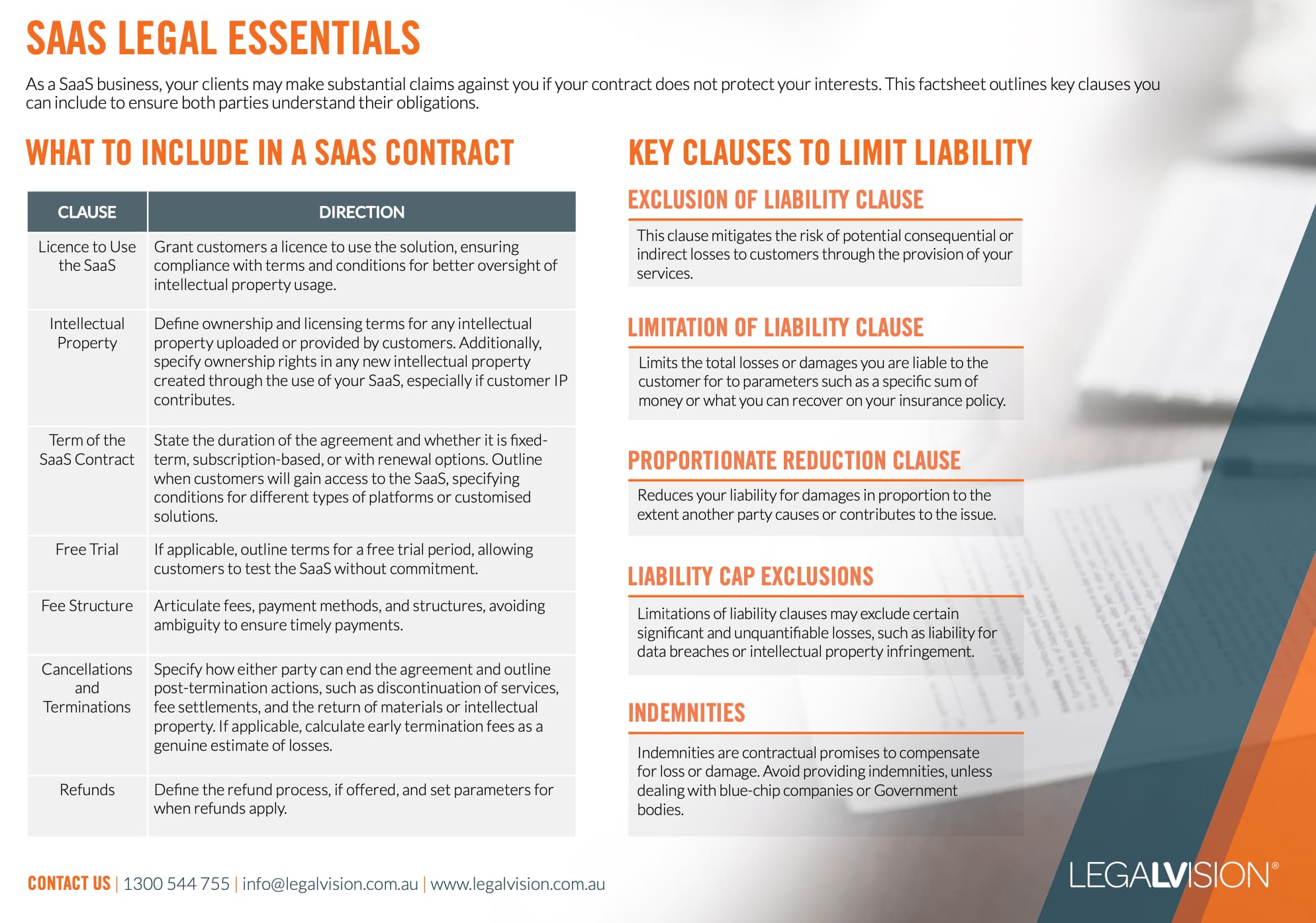In Short
- Clearly define the scope of services, deliverables, and exclusions to prevent disputes and scope creep.
- Protect your intellectual property, including pre-existing tools and methodologies, and set fair payment terms with safeguards for late or missed payments.
- Include liability limits and termination clauses to manage risk and ensure you are paid for completed work.
Tips for Businesses
Invest time in drafting a thorough consultancy agreement before starting any IT project. Clearly outline services, deliverables, and exclusions, protect your intellectual property, and set milestone-based payment terms. Include liability limits and termination rights to safeguard your business, maintain professional accountability, and reduce the risk of disputes with clients.
IT consultancy agreements represent a critical legal foundation that technology professionals should establish to protect their business interests and deliver successful client outcomes. Having a robust contractual framework in place that governs their professional relationships and safeguards their intellectual property is essential for not only providing credibility to the business but also protecting the most important and valuable elements of an IT consultant’s tool kit.
This article outlines the key contractual elements and compliance considerations for IT professionals seeking to draft comprehensive consultancy agreements that protect their specialised expertise, manage liability exposure, and establish clear commercial terms for their technology services.

As a SaaS business, your clients may make substantial claims against you if your contract does not protect your interests. This factsheet outlines key clauses you can include to ensure both parties understand their obligations.
Essential Commercial Details
Scope of Services
Your agreement must include a detailed description of the specific IT services you will provide. Whether you are conducting a cybersecurity audit, developing software specifications, or creating an IT strategic plan, clarity prevents disputes about deliverables and ensures that both parties are on the same page about the services that are going to be provided.
Deliverables and Exclusions
Clearly list what you will deliver, such as:
- technical reports;
- system documentation; or
- implementation recommendations.
Fees and Timeframe
Consider how you want to charge for your services, and clearly set this out in the agreement. You may want to charge fixed project fees or hourly rates. Additionally, to help manage your workload and also avoid any projects spinning out and going for longer than they should, set clear start and end dates for your engagement, particularly important for IT projects that often face evolving requirements.
Payment Terms That Protect Your Cash Flow
IT consultancy projects can span several months, making payment terms a critical consideration. Your agreement should specify when payment becomes due and what happens if clients delay payment. Consider requiring deposits for larger projects or when cash is needed to provide services, or implementing milestone-based payments for extended engagements.
Your agreement should also include provisions that allow you to suspend services if payments fall behind schedule. This protects your business from clients who might otherwise exploit extended payment terms.
Continue reading this article below the formIntellectual Property: Your Competitive Advantage
IT consultants often develop valuable intellectual property, including methodologies for:
- conducting audits or analysis
- code libraries; and
- technical frameworks.
Ensure there are clear provisions where you retain ownership of your pre-existing intellectual property, including:
- software tools;
- assessment frameworks; and
- technical methodologies you bring to the project.
For new intellectual property created during the engagement, you need to decide whether you will license it to the client or assign ownership outright, depending on the value of the project and the specific services you are providing, and which is most appropriate.
If you assign a new IP to clients, ideally, this transfer should only occur after full payment. For ongoing relationships, consider retaining rights to use general knowledge and experience gained during the project for future clients.
Liability and Termination
IT consultants face unique liability risks. System failures, security breaches, or implementation problems can result in significant client losses. Your agreement should include reasonable liability limitations while maintaining professional accountability. This might include imposing a cap on your maximum liability to a specific amount, often tied to the project value or annual fees.
Your termination clause should address common IT consulting scenarios, such as project cancellation due to budget constraints or changes in client priorities. You should ensure that you receive payment for completed work and can retrieve your intellectual property upon termination.
Fictional Case Study: Network Security Assessment Gone Wrong
TS Solutions, a small IT consultancy company, contracted with a manufacturing company to conduct a ‘comprehensive network security assessment.’ The initial agreement lacked specific deliverables and IP ownership clauses.
Midway through the project, the client requested additional penetration testing services not included in the original scope. TS Solutions provided these services assuming they would receive additional payment. However, the client argued these services were implied in the original “comprehensive assessment” description.
When TS Solutions completed their assessment using their proprietary vulnerability scanning tools, the client demanded ownership of the scanning methodology, claiming they had paid for all project outputs. The dispute escalated when the client refused final payment, arguing that the deliverables were incomplete.
This situation could have been avoided with a properly structured agreement that clearly defined the assessment scope, excluded additional services, established ownership of pre-existing IP tools, and included dispute resolution procedures.
Key Takeaways
A well-drafted IT Consultancy Agreement protects your business interests while establishing clear expectations with clients. Focus on defining clear scope boundaries, protecting your technical methodologies, and establishing fair payment terms. Remember that the time invested in proper legal documentation pays dividends by preventing disputes and protecting your professional reputation.
If you need help with your IT consultancy service, our experienced IT lawyers can assist as part of our LegalVision membership. For a low monthly fee, you will have unlimited access to lawyers to answer your questions and draft and review your documents. Call us today on 1300 544 755 or visit our membership page.
Frequently Asked Questions
Ownership of new intellectual property depends on the terms specified in your consulting agreement. You can either retain ownership and license the IP to your client or assign ownership to the client upon full payment. However, you should always retain rights to your pre-existing intellectual property, including technical methodologies and tools you brought to the project.
Yes, your consulting agreement should include liability limitations that cap your maximum responsibility to a specific amount to minimise your risk. However, these limitations should be reasonable and commercial (otherwise, customers might lose trust in your business). The key is balancing professional accountability with protection and certainty regarding your liability under the agreement.
We appreciate your feedback – your submission has been successfully received.












